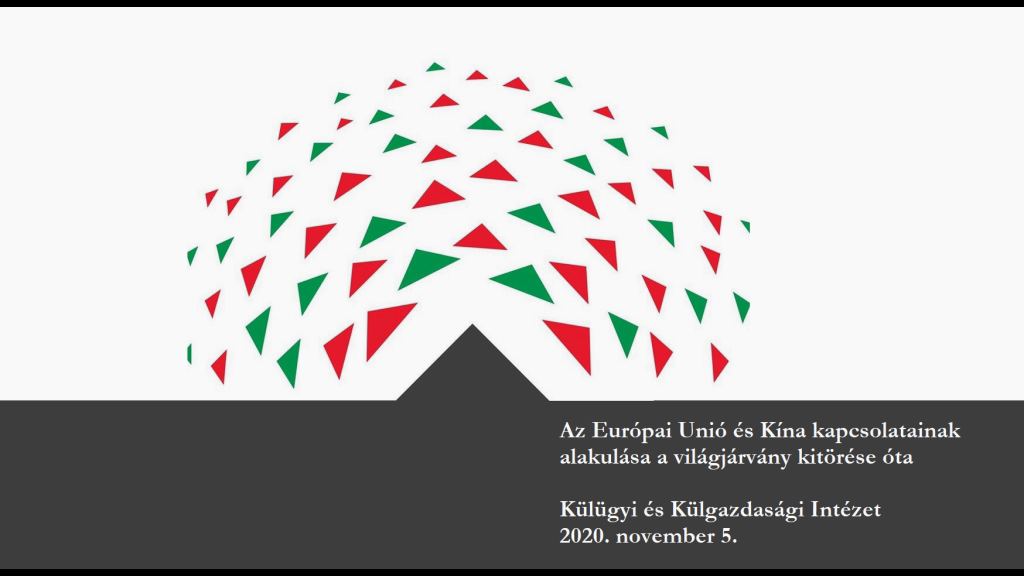On 5 November 2020, the Institute for Foreign Affairs and Trade (IFAT) hosted an online roundtable discussion with the title EU-China relations since the outbreak of the global pandemic. Mr. Gergely Fejérdy, Mr. Tamás Molnár and Mr. Gergely Salát, researchers of IFAT were participating as panellists.
In his introductory remarks, Mr. Tamás Molnár emphasised that Germany’s China policy is mainly driven by economic a trade related issues. Between 2016 and 2019 bilateral relations had been characterised by increasing confrontation, followed by a period of improvement as the German government tried to avoid alienating China amid the uncertain global economic environment. Mr. Gergely Fejérdy underlined that since 2017 the French China-policy had been increasingly characterised by distrust. In the perspective of Paris, China means both opportunity and risk, however the EU should speak to Beijing with a single voice. Mr. Gergely Salát highlighted that from China’s perspective the EU-relations had been ideal, as the Union had not been a rival in terms of security policy while the country had gained access to advanced technologies through acquisitions and through the investment projects of European companies. For now, China has failed to find the appropriate answer for the changing attitude and the growing critics from the EU. The relationship is extremely complex as the EU and China are partners, friends, rivals and opponents at the same time.
During the discussion it was declared that with the COVID-19 outbreak European countries had realised the exposure created by the outsourcing of production to China, therefore the issue of sovereignty had received more emphasis in recent months. Tensions around the pandemic had created so intense political antipathy in France towards China that the European country introduced a de facto ban on Huawei 5G equipment in the medium term. Mr. Gergely Salát emphasised that in China there was no consensus on how to manage international criticism and image problems related to the pandemic and this partly explains the overcompensating communication of certain Chinese diplomats in Europe. However, all of this caused a damage in perceptions of China that cannot be fully restored. Referring to different surveys, the researchers displayed that perceptions of both the USA and China deteriorated in the EU countries. Regarding the US-China conflict, the panellists explained that it was the interest of the EU to avoid siding with either of the great powers against the other one. They agreed on that a massive wave of reshoring of European companies from China is unlikely not even due to newly introduced tax allowances. Firstly, EU member states do not have such amount of financial resources for that, and secondly the attractiveness of the Chinese market may still make local manufacturing in the Asian country economically reasonable.
For the full recording (in Hungarian) please click on the link below or visit our YouTube channel!
JTNDaWZyYW1lJTIwd2lkdGglM0QlMjIxMDAlMjUlMjIlMjBoZWlnaHQlM0QlMjI0NTAlMjIlMjBzcmMlM0QlMjJodHRwcyUzQSUyRiUyRnd3dy55b3V0dWJlLmNvbSUyRmVtYmVkJTJGNVNCc2tIUlZBWHMlMjIlMjBmcmFtZWJvcmRlciUzRCUyMjAlMjIlMjBhbGxvdyUzRCUyMmFjY2VsZXJvbWV0ZXIlM0IlMjBhdXRvcGxheSUzQiUyMGNsaXBib2FyZC13cml0ZSUzQiUyMGVuY3J5cHRlZC1tZWRpYSUzQiUyMGd5cm9zY29wZSUzQiUyMHBpY3R1cmUtaW4tcGljdHVyZSUyMiUyMGFsbG93ZnVsbHNjcmVlbiUzRSUzQyUyRmlmcmFtZSUzRQ==
